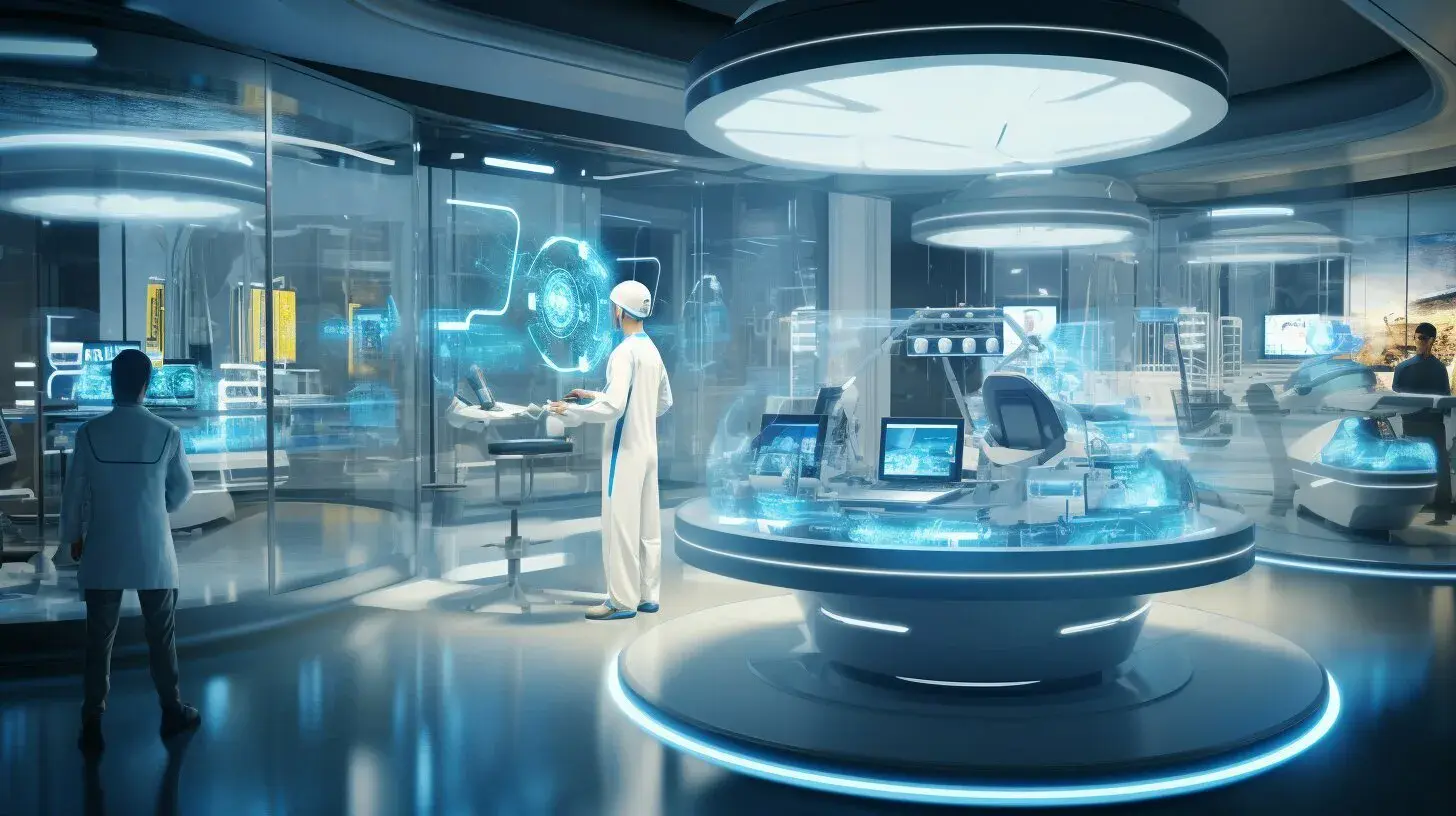Introduction
The healthcare industry is undergoing a transformative shift with the integration of Artificial Intelligence (AI) in hospital operations and workflow optimization. AI is not just a buzzword; it’s a revolutionary tool that is reshaping how hospitals function, enhancing efficiency, and improving patient care. This article delves into the role of AI in optimizing hospital operations and workflow, providing valuable insights backed by authentic statistics and real-world examples.
The Growing Importance of AI in Healthcare
AI technologies are increasingly being adopted in healthcare due to their potential to streamline operations, reduce costs, and improve patient outcomes. According to a report by Accenture, AI applications in healthcare could save the U.S. healthcare economy $150 billion annually by 2026. This statistic alone highlights the significant impact AI can have on the industry.
Key Areas Where AI is Making an Impact
AI is being utilized in various aspects of hospital operations, from administrative tasks to clinical decision-making. Here are some key areas where AI is making a significant impact:
Patient Scheduling and Appointments: AI algorithms can predict patient no-shows and optimize scheduling, ensuring that hospital resources are used efficiently.
Diagnostic Accuracy: AI-powered tools can analyze medical images and patient data to assist in accurate diagnosis, reducing the risk of human error.
Medical History Analysis: AI systems can quickly analyze a patient’s medical history to provide doctors with relevant information, improving decision-making.
AI Medical Chatbots: These chatbots can handle patient inquiries, provide medical information, and even assist in triaging cases, reducing the burden on healthcare staff.
Supply Chain Management: AI can predict inventory needs and optimize supply chain operations, ensuring that hospitals are always stocked with necessary supplies.
AI in Optimizing Hospital Workflow
Enhancing Patient Scheduling
Efficient patient scheduling is crucial for optimizing hospital workflow. AI algorithms analyze historical data, patient demographics, and other factors to predict appointment no-shows and cancellations. This allows hospitals to overbook strategically, ensuring that resources are not wasted. Additionally, AI can help in rescheduling appointments dynamically, minimizing waiting times for patients.
Improving Diagnostic Accuracy
AI-powered diagnostic tools have shown remarkable accuracy in identifying diseases. For instance, a study published in the journal Nature reported that an AI system developed by Google Health outperformed radiologists in detecting breast cancer from mammograms. These tools can analyze vast amounts of data, including medical images and patient records, to assist doctors in making accurate diagnoses.
Streamlining Administrative Tasks
Administrative tasks, such as billing and coding, can be time-consuming and prone to errors. AI can automate these processes, reducing the administrative burden on hospital staff. For example, AI can automatically code medical records, ensuring accuracy and compliance with regulations. This not only saves time but also reduces the risk of billing errors and subsequent audits.
Optimizing Medical History Analysis
AI systems can quickly analyze a patient’s medical history, extracting relevant information and presenting it to healthcare providers. This enables doctors to make informed decisions quickly, especially in emergency situations. For instance, AI can identify patterns in a patient’s medical history that may indicate a risk of certain conditions, allowing for early intervention.
AI Medical Chatbots
AI medical chatbot are revolutionizing patient interaction. These chatbots can handle routine inquiries, provide medical information, and even assist in initial assessments. For example, Babylon Health’s AI chatbot can assess symptoms and provide advice on the next steps, whether it’s self-care, visiting a doctor, or seeking emergency care. This reduces the workload on healthcare staff and ensures that patients receive timely information.
Enhancing Supply Chain Management
Effective supply chain management is essential for hospital operations. AI can predict inventory needs based on historical data and current usage patterns. This ensures that hospitals are always stocked with necessary supplies without overstocking, which can lead to wastage. For instance, AI can analyze the usage of surgical instruments and predict when they need to be sterilized or replaced, ensuring smooth operations in the operating room.
Real-World Examples of AI in Hospital Operations
Case Study: Johns Hopkins Hospital
Johns Hopkins Hospital has implemented AI to optimize its surgical scheduling. The AI system analyzes data on surgical procedures, patient outcomes, and resource availability to create optimal schedules. This has led to a 30% increase in surgical volume and a significant reduction in patient wait times.
Case Study: Mayo Clinic
Mayo Clinic uses AI to enhance diagnostic accuracy in its radiology department. The AI system analyzes medical images and compares them with a vast database of images to identify potential issues. This has improved the accuracy of diagnoses and reduced the need for follow-up tests.
The Future of AI in Hospital Operations
Predictive Analytics
Predictive analytics is one of the most promising applications of AI in healthcare. By analyzing historical data and identifying patterns, AI can predict patient outcomes, disease outbreaks, and resource needs. For example, AI can predict which patients are at risk of developing complications after surgery, allowing for preventive measures to be taken.
Personalized Medicine
AI has the potential to revolutionize personalized medicine by analyzing a patient’s genetic information, lifestyle, and medical history to create tailored treatment plans. This approach can improve treatment outcomes and reduce the risk of adverse reactions.
Integration with IoT
The integration of AI with the Internet of Things (IoT) can further enhance hospital operations. IoT devices can collect real-time data on patient health, equipment usage, and environmental conditions. AI can analyze this data to optimize hospital operations, such as adjusting staffing levels based on patient influx or predicting equipment failures before they occur.
Challenges and Considerations
Data Privacy and Security
The use of AI in healthcare raises concerns about data privacy and security. Hospitals must ensure that patient data is protected and comply with regulations such as the Health Insurance Portability and Accountability Act (HIPAA). Implementing robust cybersecurity measures and maintaining transparency with patients about data usage are essential steps.
Ethical Considerations
The use of AI in healthcare also raises ethical considerations. For instance, there may be concerns about bias in AI algorithms, which can lead to disparities in care. Hospitals must ensure that AI systems are trained on diverse datasets and regularly audited for fairness and accuracy.
Integration with Existing Systems
Integrating AI with existing hospital systems can be challenging. Hospitals must ensure that AI systems are compatible with their current electronic health record (EHR) systems and other infrastructure. This may require significant investments in technology and training for staff.
Conclusion
The integration of AI in hospital operations and workflow optimization holds immense potential to transform the healthcare industry. From enhancing patient scheduling and diagnostic accuracy to streamlining administrative tasks and optimizing supply chain management, AI is proving to be a valuable tool for hospitals. Real-world examples from leading institutions like Johns Hopkins Hospital and Mayo Clinic demonstrate the tangible benefits of AI in healthcare.
As the technology continues to evolve, we can expect even more innovative applications of AI in healthcare, such as predictive analytics and personalized medicine. However, it is crucial for hospitals to address challenges related to data privacy, ethical considerations, and system integration to fully harness the potential of AI.
By embracing AI, hospitals can not only improve operational efficiency but also enhance patient care, ultimately leading to better health outcomes and a more sustainable healthcare system.




